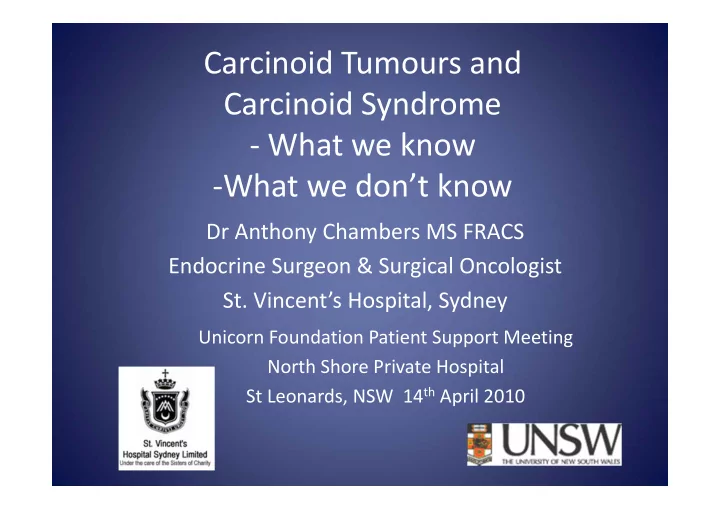

Carcinoid Tumours and Carcinoid Syndrome ‐ What we know ‐ What we don’t know Dr Anthony Chambers MS FRACS Endocrine Surgeon & Surgical Oncologist St. Vincent’s Hospital, Sydney Unicorn Foundation Patient Support Meeting North Shore Private Hospital St Leonards, NSW 14 th April 2010
Dr Janice Pasieka
Neuroendocrine Tumour Clinic University of Calgary • 15 years • Multidisciplinary – Endocrinologist – Dr Otto Rorstad – Endocrine Surgeon – Dr Janice Pasieka – Hepatobiliary Surgeon – Dr Elijah Dixon – Nuclear Medicine Physician – Dr Ernst Postema – Clinical Geneticist – Dr Michael Innes • Referral center for Western Canada
Gastrointestinal NET • Tumours derived from Enterochromaffin Cells (EC cells) • Most common sites – Small intestine – Appendix – Colon & Rectum
Enterochromaffin (EC) cells
Enterochromaffin (EC) cells
Enterochromaffin (EC) cells Serotonin (5 ‐ HT) blood flow secretions peristalsis Metabolized & inactivated by liver Measure in urine – 5HIAA
Enterochromaffin (EC) cells Serotonin (5 ‐ HT) Melatonin Substance P Guanylin Histamine Bradykinin Chromogranin Growth factors
Intestinal contents Adjacent nerves Somatostatin ‐ (octreotide, lanreotide, LAR)
Primary Tumours
Mesenteric Primary Lymph nodes Tumours
Liver Metastases Mesenteric Primary Lymph nodes Tumours
Carcinoid Syndrome • Flushing of skin • Diarrhoea • Bronchospasm / wheezing • Heart valve fibrosis – Tricuspid and pulmonary valves
Carcinoid Syndrome • Tests – 24 hr urine 5 ‐ HIAA – Serum Chromogranin ‐ A • Medical treatment – Octreotide / lanreotide / LAR
Blood Brain Barrier
Research study ‐ Calgary • Patients with Carcinoid Syndrome – ‘not themselves’ – ‘difficulty remembering things’ – ‘not as on the ball as they used to be’ – ‘finding work difficult’ • ? symptoms of cognitive difficulties
Research study ‐ Calgary • 21 patients – all small intestine NET with liver metastases & carcinoid syndrome • Cognitive symptom questionnaire • Formal neurocognitive testing by psychologist
Symptom Assessment 38 ‐ Question standardized Multiple Ability Self ‐ reporting Questionnaire (MASQ) Cognitive Domain Symptom score Language 1 – 5 Attention / Concentration 1 – 5 Visual-Perceptual function 1 – 5 Visual memory 1 – 5 Verbal memory 1 – 5 1 5 Asymptomatic Most severe symptoms
MASQ Symptom scores Score ± Cognitive Domain Healthy s.d. norms (1 - 5) 2.75 ± 0.5 Verbal memory <2.1 2.41 ± 0.7 Attention / <2.0 Concentration 2.31 ± 0.6 Language skills <1.8 2.30 ± 0.7 Visual memory <1.8 2.17 ± 0.6 Visual-Perceptual <2.0 function
Cognitive Testing Formal assessment ‐ Neuropsychologist Battery of 6 standardized cognitive tests Cognitive Domain Test Attention / Concentration -Trail making test -Verbal series attention Execute skills / function Wisconsin card sorting Visual-Perceptual function Complex figure recall Language Word & category fluency Visual memory Complex figure recall Verbal memory Selective reminding
Summary of Results Cognitive Domain Symptom Cognitive Scores testing Attention/ Normal Concentration Language skills Normal Verbal memory - Immediate recall Normal - Delayed recall Visual-Percept Function Visual memory
? Cause ‐ Serotonin? Blood Brain Barrier ‐ Another tumour substance? ‐ treatment? ‐ malignancy? ‐ tryptophan depletion?
Carcinoid Syndrome • Our understanding of Carcinoid Syndrome is slowly improving • Need for more research to more fully understand effects • Plan for future research at St. Vincent’s Hospital, Garvan Institute & University of Calgary
Recommend
More recommend